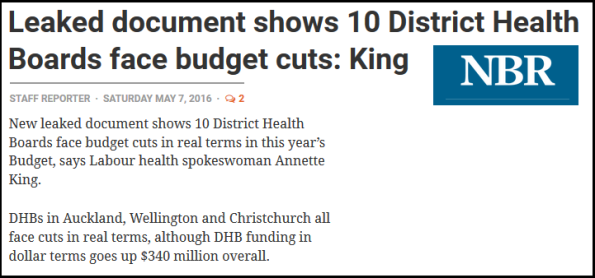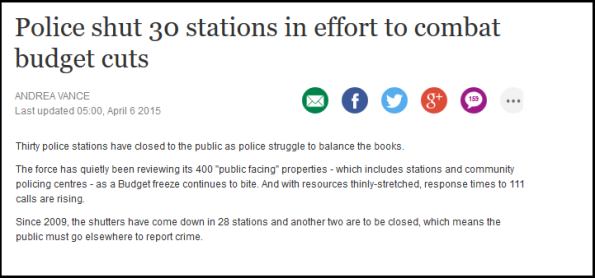The seductiveness of Trumpism
.
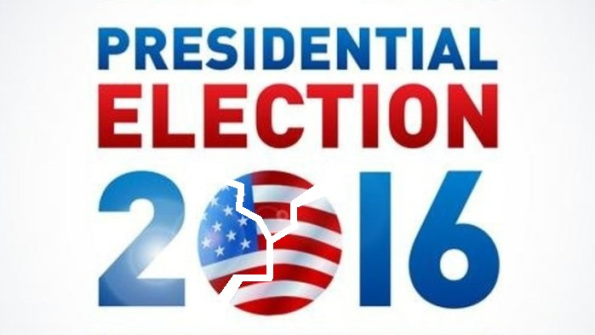
.
The 5 percent of Americans with the highest incomes now account for 37 percent of all consumer purchases, according to the latest research from Moody’s Analytics. That should come as no surprise. Our society has become more and more unequal.
When so much income goes to the top, the middle class doesn’t have enough purchasing power to keep the economy going without sinking ever more deeply into debt — which, as we’ve seen, ends badly.
[…]
The real reason for America’s Great Regression was political. As income and wealth became more concentrated in fewer hands, American politics reverted to what Marriner S. Eccles, a former chairman of the Federal Reserve, described in the 1920s, when people “with great economic power had an undue influence in making the rules of the economic game.” With hefty campaign contributions and platoons of lobbyists and public relations spinners, America’s executive class has gained lower tax rates while resisting reforms that would spread the gains from growth.
Yet the rich are now being bitten by their own success. Those at the top would be better off with a smaller share of a rapidly growing economy than a large share of one that’s almost dead in the water. – Robert Reich, New York Times, 3 September 2011
.
“Neoliberalism as never been, and is not, a coherent set of economic principles, the presence or absence of which in any given policy prescription determines the strength or weakness of its ideological credentials. Indeed, neoliberalism, far from being some sort of neo-classical economic crusade, is what it has always been: the fearsomely coherent political project of global capitalism’s ruling elites.
Its anti-state/free market propaganda notwithstanding, neoliberalism’s purpose has always been to use the coercive power of the state to thwart and/or reverse any and all attempts to empower the many at the expense of the few.
As Professor David Harvey notes in his A Brief History of Neoliberalism:
“Redistributive effects and increasing social inequality have in fact been such a persistent feature of neoliberalisation as to be regarded as structural to the whole project. Gérard Duménil and Dominique Lévy, after careful reconstruction of the data, have concluded that neoliberalisation was from the very beginning a project to achieve the restoration of class power”.” – Chris Trotter, Bowalley Road, 30 May 2015
.
“…the share of population living in poverty is at a very high level. The latest data shows almost 15 percent of the American population of 46.7 million people living in poverty, and those numbers are even higher, if you concentrate on certain groups, particularly minority, single parents, especially female-headed families, and it is heavier for young people and those with disability.
So, with such large share of the population living below the poverty line, this has important macroeconomic issues, let alone the concern that is of a more political nature, which we will not address. But if we look at the macroeconomic impact, not only does poverty create significant social strains, it also eats into labor force participation, and undermines the ability to invest in education, to invest in health, to invest in training, and by holding back economic and social mobility it creates not only a poverty impact on this generation, but it certainly can make it more sustainable inter-generationally.” – Christine Lagarde, Managing Director, IMF, 22 June 2016
.
In America, the full impact of a neo-liberal agenda hit Kansas so harshly that comedian/commentator, Seth Meyer, was unflinching with his scathing, mocking, satire at the travesty that had resulted;
.
.
After his election in 2010, Republican Kansas state governor, Sam Brownback, made massive cuts personal and business income taxes on the neo-liberal premise that low (and in some cases, nil) taxes would result in massive job-creation and increased economic activity by local businesses.
The tax-cuts were heavily supported by right-wing billionaire Koch Brothers;
Kansas also completely erased the income tax bills for the owners of certain “small” businesses, totaling 330,000 by this year and including a host of subsidiaries of Wichita-based Koch Industries. The Koch-funded organization Americans for Prosperity helped Brownback push the bill and has remained a staunch defender of the changes.
The result was utterly predictable;
The predicted job growth from business expansions hasn’t happened, leaving the state persistently short of money. Since November, tax collections have fallen about $81 million, or 1.9 percent below the current forecast’s predictions.
[…]
Last month, Brownback ordered $17 million in immediate reductions to universities and earlier this month delayed $93 million in contributions to pensions for school teachers and community college employees. The state has also siphoned off more than $750 million from highway projects to other parts of the budget over the past two years.
School teachers, college employees, the State University, schools, poverty-programmes, medicare, and other services all faced budgetary cuts.
The business website, Bloomberg, was less than impressed;
Kansas has lagged Nebraska in job creation since 2011, and the gap has widened since late 2014. Instead of adding the 25,000 jobs a year that Brownback promised, Kansas actually lost 5,400 jobs over the 12 months ending in February.
The author, Justin Fox, made the eye-brow-raising under-statement of the year by declaring;
This doesn’t look great for Kansas.
There’s an age-old saying for such under-statements. Click here.
Little wonder that Fox headed his article; “Kansas Tried Tax Cuts. Its Neighbor Didn’t. Guess Which Worked“.
The owners/editor of Bloomberg appeared to ‘freak out’ at the prospect of publishing a story so utterly revealing of such an epic fail of neo-liberal dogma. The editor/owner posted at the bottom of Fox’s article;
This column does not necessarily reflect the opinion of the editorial board or Bloomberg LP and its owners.
Of course not. That might be embarrassing. Having to admit to the Masses that one of neo-liberalism’s main tenets is actually bullshit, is not a good look.
Even Governor Brownback’s fellow Republicans were panicking, as they faced re-election this month, and the wrath of voters;
Now many of the same Republicans who helped pass Brownback’s plan are in open revolt, refusing to help the governor cut spending so he can avoid rolling back any of his signature tax measures.
[…]
“Let him own it,” Republican Rep. Mark Hutton said. “It’s his policy that put us there.”
[…]
“We’re growing weary,” said Senate President Susan Wagle, a conservative Republican from Wichita. While GOP legislators still support low income taxes, “we’d prefer to see some real solutions coming from the governor’s office,” she said.
In an example of how Republican’s take personal responsibility, Governor Brownback told journalists who was to blame for his “real live experiment“;
“You’ve got some global issues that are going on that we have absolutely no control over.”
That’s how you take Personal Responsibility: blame others.
As Kansas is slowly bankrupted, Trump appears not to have learned from Brownback’s economic ineptness, saying;
“Under my plan, I’ll be reducing taxes tremendously, from 35 percent to 15 percent for companies, small and big businesses. That’s going to be a job creator like we haven’t seen since Ronald Reagan. It’s going to be a beautiful thing to watch. Companies will come. They will build. They will expand. New companies will start. And I look very, very much forward to doing it.” – Donald Trump
Trump’s plan to cut taxes mirrors the Republican “experiment” in Kansas. It simply remains unclear why Trump believes the results will be any different.
Meanwhile, here in New Zealand, the re-distribution of wealth up-ward, through successive tax-cuts for the richest, echoed that taking place thousands of kilometres away in a central US state.
In 2009 and 2010, National cut taxes and increased gst. (There have been seven tax cuts since 1986.) This shifted wealth up-ward to higher-income earners.
As government revenue fell, budget cuts to spending on services followed;
.
.
.
.
.
.
.
.
Even as recent tax cuts resulted in wealth re-distributed upward; wage growth remaining low or stagnant; and social services reduced – New Zealanders are still not facing the dire economic and social hardship faced by our American cousins.
In September 2011, forward-thinking American economist Robert Reich explained how a worsening economic crisis in the US was affecting the middle classes;
Some say the regressive lurch occurred because Americans lost confidence in government. But this argument has cause and effect backward. The tax revolts that thundered across America starting in the late 1970s were not so much ideological revolts against government — Americans still wanted all the government services they had before, and then some — as against paying more taxes on incomes that had stagnated. Inevitably, government services deteriorated and government deficits exploded, confirming the public’s growing cynicism about government’s doing anything right.
Some say we couldn’t have reversed the consequences of globalization and technological change. Yet the experiences of other nations, like Germany, suggest otherwise. Germany has grown faster than the United States for the last 15 years, and the gains have been more widely spread. While Americans’ average hourly pay has risen only 6 percent since 1985, adjusted for inflation, German workers’ pay has risen almost 30 percent. At the same time, the top 1 percent of German households now take home about 11 percent of all income — about the same as in 1970. And although in the last months Germany has been hit by the debt crisis of its neighbors, its unemployment is still below where it was when the financial crisis started in 2007.
How has Germany done it? Mainly by focusing like a laser on education (German math scores continue to extend their lead over American), and by maintaining strong labor unions.
THE real reason for America’s Great Regression was political. As income and wealth became more concentrated in fewer hands, American politics reverted to what Marriner S. Eccles, a former chairman of the Federal Reserve, described in the 1920s, when people “with great economic power had an undue influence in making the rules of the economic game.” With hefty campaign contributions and platoons of lobbyists and public relations spinners, America’s executive class has gained lower tax rates while resisting reforms that would spread the gains from growth.
Yet the rich are now being bitten by their own success. Those at the top would be better off with a smaller share of a rapidly growing economy than a large share of one that’s almost dead in the water.
The economy cannot possibly get out of its current doldrums without a strategy to revive the purchasing power of America’s vast middle class. The spending of the richest 5 percent alone will not lead to a virtuous cycle of more jobs and higher living standards. Nor can we rely on exports to fill the gap. It is impossible for every large economy, including the United States, to become a net exporter.
Reviving the middle class requires that we reverse the nation’s decades-long trend toward widening inequality. This is possible notwithstanding the political power of the executive class. So many people are now being hit by job losses, sagging incomes and declining home values that Americans could be mobilized.
And mobilised they have been.
Whatever one thinks of Republican presidential candidate, Donald Trump, he has tapped into the psyche of the disaffected; the disenchanted; and the dispossessed. And they are legion in number.
According to US Census Bureau, there are some 43.1 million Americans currently living in poverty – 13.5%. (The Bureau states that poverty has fallen by 3.5 million people since 2014.)
The lives of ordinary Americans is now stressed and wretched, as Australia’s ABC journalist, Elle Hardy recently reported;
When fun-loving 34-year-old George Tabor died suddenly in the town of Tifton in America’s Deep South, his family was bereft.
It confirmed again that the American Dream is a vision that’s moved beyond the reach of millions of its citizens.
George’s family struggled with the immense grief of his loss, but they were also plunged into a financial crisis, not knowing how they could fund his funeral or medical bills.
“The very first day, as we were dealing with the fact that he’s gone, the first thing that was in my mind was that all these bills were about to fall on us,” his older sister Doris Stafford, 36, said.
George and his sisters all worked. Their mother had worked her whole life too. Yet, as workers on minimum pay rates, just coping with weekly needs is an endless treadmill.
George Tabor was in goodhealthbefore he suddenly fell ill.(Supplied: Doris Stafford)Having savings to buffer sudden emergencies, or even a plan for a more secure future, is a story from Fantasyland for this family, and for up to nearly 70 per cent of Americans, according to a recent survey.
In this election year, as the anger of the marginalised and threatened has taken centre stage, it’s rocked the established verities of American political culture.
The IMF warned in June of social strains if the US fails to address soaring rates of poverty, in this richest of First World economies.
On the ground, it’s the immediate daily strains that occupy people’s minds.
George’s sister Sherry Smith, 31, began receiving George’s medical bills at the apartment they’d shared. Meanwhile, Doris was working out how to come up with $US5,100 ($6,610) for his funeral.
For workers earning about $US290 ($375) a week, the challenge is astronomical.
Robert Reich’s simple infograph (below) demonstrates convincingly that pay rose with productivity until the late ’70s /early ’80s. At that point in our global history, Thatcherism and Reaganism impacted on their respective nations, the UK and USA.
.
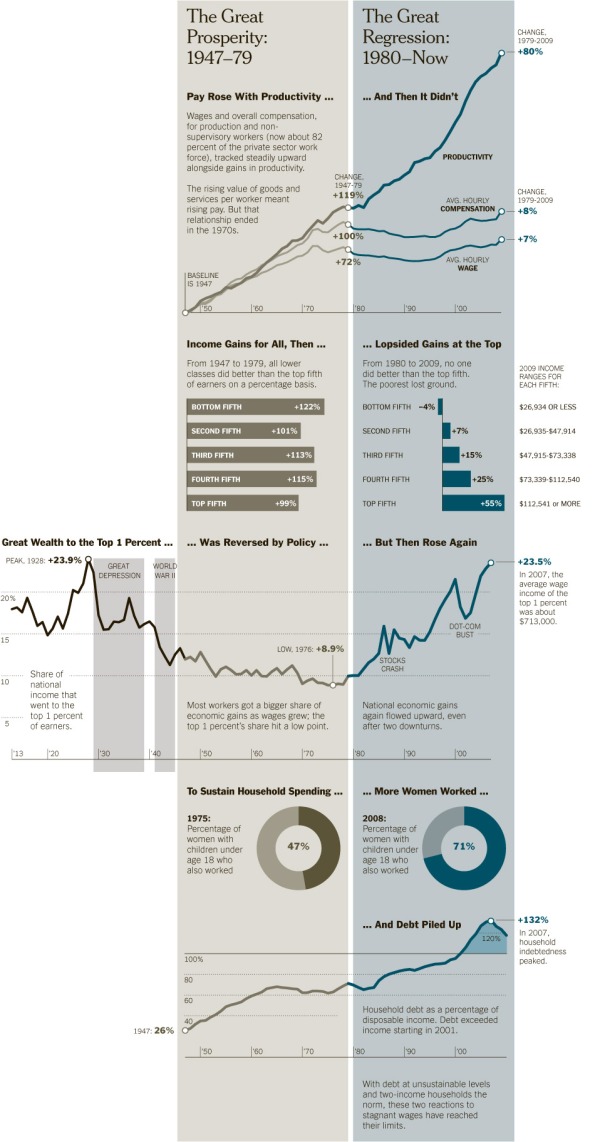
.
New Zealand followed half a decade later. We now face our own social fall-out from the introduction of neo-liberalism; high-unemployment; under-employment; unaffordable housing; low wages; student debt; growing child poverty; and a widening wealth/income gap;
In its latest survey of household wealth, Statistics New Zealand found the country’s richest individuals – those in the top 10 percent – held 60 percent of all wealth by the end of July 2015. Between 2003 and 2010, those individuals had held 55 percent.
It is little wonder that with increasing globalisation, corporations have shifted jobs to developing nations where wages are low and working conditions next-to-nil.
Western workers have lost out to their counterparts in China, India, Pakistan, Vietnam, etc.
That has meant vast swathes of US industries closing down until major cities such as Detroit – once a major economic powerhouse for the nation – went bankrupt in 2013. Millions of workers have lost their jobs or have taken lower-paid employment.
The story of George and his family continues;
If there was any mercy in George’s death, it was that when it came, it was immediate. But in the weeks leading to it, there was much that was preventable.
When a persistent cough started nagging, he put it down to smoking. When the hacking began, a doctor’s charges and medicine costs were off-putting.
Finally, coughing and unable to breathe, he asked friends to take him to hospital. Some laughed it off as another prank.
“We didn’t find out he was sick until he’d been in hospital for three days,” Doris says. “We found out on Facebook.”
George had pneumonia. As he lay in a coma, the family assumed he was insured through his job and contacted his employer. Low-wage workers rely on employer-provided health care, or they go without.
“Applebee’s said he wasn’t eligible for insurance until next January, even though he’d been working there a year and a half,” Sherry said.
Frequent visits from the hospital’s “financial people” compounded their stress.
The family believe that if George had medical insurance, the hospital would have let him stay. Tests revealed he had an abnormal swelling in a heart blood vessel. Corrective surgery was scheduled for November 1, but the hospital sent him home.
“He was sent home with no medication,” Sherry says. “He couldn’t walk, his feet were still swollen. He tried to stand and he fell over.”
Private health insurance costs thousands of dollars a year in the US. Even the much-vaunted Obamacare seems to miss its targets.
“At first I thought Obamacare would be a good idea,” Doris says. “When they told me the price, $57 a week — it was $57 I didn’t have in the first place.”
The family has always voted Democrat. But this time it’s different. With worries about jobs, and living in quiet despair, the Republican candidate is winning her over.
George Tabor’s family was not alone. There were millions of George Tabor Families throughout the United States. And they were no longer listening to the political establishment.
In a moment of prescience, Billionaire investor Warren Buffett warned;
Americans are rapidly losing faith in the ability of Congress to deal with our country’s fiscal problems. Only action that is immediate, real and very substantial will prevent that doubt from morphing into hopelessness. That feeling can create its own reality.
Buffett wrote his words in August, 2011.
Since the late 1970s, both Republican and Democrat parties have failed to address the growing threat to Middle Class stability, and to Working Class aspirations in the US. Both parties had deserted their constituents, leaving people stressed, desperate, and fearful.
The forces of globalisation/neo-liberalism/free market has robbed millions of American families of what they considered their birthright – a high standard of living unparalleled in the world, and opportunities for their children.
.
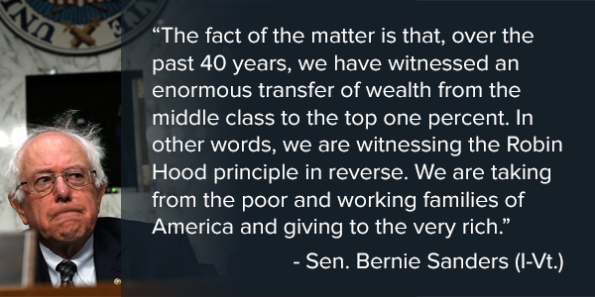
.
There was a vacuum left by the political establishment, and Donald Trump shrewdly colonised that space. Trump had created the new “reality” that Buffett warned us about.
The feeling of desperation and alienation from both Working and Middle classes is now so palpable that mainstream media are finally coming to terms with that disaffection and understand what constituted the almost-irresistable force that propelled an ego-driven, political novice to the White House.
Despite Trump being a seriously flawed, undisciplined individual who has alienated large numbers of American voters; women, blacks, Hispanics, LGBT, disabled – I think we all underestimated the anger of the Masses that Trump was feeding off.
I glimpsed a miniscule fraction of that anger last week when I watched ‘Sixty Minutes‘. A journalist was talking to five disaffected blue-collar workers in Ohio.
These were supposedly Democrat-voting, Union-loyal, workers.
But at least three openly declared their intention to vote for Trump (story starts at 25:12);
.

.
It was at that point that I finally understood what inexorable force was propelling a bloated billionaire to the most powerful position on this planet.
As former Republican Party operative, Mike Lofgren, wrote in September 2011;
It should have been evident to clear-eyed observers that the Republican Party is becoming less and less like a traditional political party in a representative democracy and becoming more like an apocalyptic cult, or one of the intensely ideological authoritarian parties of 20th century Europe. This trend has several implications, none of them pleasant.
[…]
What do the Democrats offer these people? Essentially nothing. Democratic Leadership Council-style “centrist” Democrats were among the biggest promoters of disastrous trade deals in the 1990s that outsourced jobs abroad: NAFTA, World Trade Organization, permanent most-favored-nation status for China. At the same time, the identity politics/lifestyle wing of the Democratic Party was seen as a too illegal immigrant-friendly by downscaled and outsourced whites.
While Democrats temporized, or even dismissed the fears of the white working class as racist or nativist, Republicans went to work.
Lofgren‘s entire piece is worthwhile reading.
So the ground was fertile for someone who would supposedly articulate the feelings of betrayal and loss for millions of disaffected, confused, resentful Americans.
People are pissed off, and they ain’t going to take it any more. They are fighting back. Like their British counter-parts during the “Bexit/EU” referendum, a considerable segment of American voters lashed out at “The Establishment”. It’s as if millions of Americans suddenly woke up, realising the supreme power of their vote.
The system could take away their jobs; their standard of living; their aspirations – but their right to vote was cast in granite-stone. Like their right to “bear arms” and casually shoot each other at whim, it was guaranteed by their Constitution.
Early last century, when Russians lashed out at the autocratic Establishment of the Russian royal family, they installed a far-left regime, the Bolsheviks.
But Americans don’t do left-wing revolutions.
When Americans revolt en-masse, they lurch to the Right.
In this case, a dangerously nationalistic, reactionary Right that is closer to the French National Front than the US Republican Party. (Though many would assert that the only real difference between the French National Front and the US Republican Party is that the latter is willing to tolerate immigrants for cheap, exploitable labour.)
Those who voted for Trump have done so for a myriad of reasons, many of which are fluid and inter-changeable. They see Trump as someone outside the political Establishment; someone who will be their champion.
But Donald Trump will not be that champion. Demogogues with simplistic answers to complex problems rarely are. History is replete with demagogues who have exploited peoples’ legitimate discontent to gain power and subsequently wreaked havoc.
If Americans think they have just elected the solution to their problems, they are sadly mistaken.
Their problems have only just begun.
Meanwhile, from a global perspective, the Left is confronted with a serious crisis of confidence: when Working Class people turn to jingoistic demagoguery for solutions, why is our message not getting through?
Perhaps that is the real crisis confronting us.
.
.
.
References
New York Times: The Limping Middle Class
International Monetary Fund (IMF): Transcript of a Press Conference on the Conclusion of the 2016 Article IV Consultation Mission with the United States
Youtube: Kansas Tax Cuts – A Closer Look
Motherjones: Trickle-Down Economics Has Ruined the Kansas Economy
The New Yorker: Covert Operations
CBS News: Kansas loses patience with Gov. Brownback’s tax cuts
Kansas City Star: Gov. Sam Brownback cuts higher education as Kansas tax receipts fall $53 million short
Bloomberg: Kansas Tried Tax Cuts. Its Neighbor Didn’t. Guess Which Worked
Democracy Now: Expanding the Debate – Jill Stein “Debates” Clinton & Trump in Democracy Now! Special – Part 1
NZ Kindergartens Inc: Funding cuts take effect
NBR: Leaked document shows 10 District Health Boards face budget cuts – King
Fairfax media: Police shut 30 stations in effort to combat budget cuts
Radio NZ: Patients suffering because of surgery waits – surgeon
NZ Family Violence Clearinghouse: Lead up to Budget 2016 – Govt announces funding cuts, increases and reprioritising
Radio NZ: Funds cut from parents-as-teachers scheme
TVNZ News: Kiwi charities and NGOs face closure with impending funding cuts
Radio NZ: Unemployment rises, wage growth subdued
ABC News:US election: Life and death in Georgia and the end of the American Dream
US Census Bureau: Income, Poverty, and Health Insurance Coverage – 2015
USA Today: Detroit becomes largest U.S. city to enter bankruptcy
Radio NZ: 10% richest Kiwis own 60% of NZ’s wealth
Truthout: Goodbye to All That – Reflections of a GOP Operative Who Left the Cult
The New York Times: Stop Coddling the Super-Rich – Warren Buffett
Prime TV: Sixty Minutes
Other Blogposts
Bowalley Road: Clever Strategy vs Desperate Tactics – Hillary Clinton Allows Donald Trump To Survive The Second Presidential Debate.
Bowalley Road: Raising Nixon’s Ghost
Bowalley Road: Why the Greater Good requires Americans to vote for the Lesser Evil – Hillary Clinton
Bowalley Road: The Better Angel: Why Birgitte Nyborg Beats Donald Trump
Gordon Campbell: on the US election home stretch
Kiwipolitico: Social origins of the Politically Absurd
No Right Turn: This is not what democracy looks like
Public Address: The Long, Strange Trip
The Daily Blog: LaQuisha St Redfern vs Donald Trump
The Daily Blog: The horror of Clinton winning vs the horror of Trump winning – voting for the lesser of two evils is still voting for evil
The Daily Blog: American Demockery
The Daily Blog: The latest Trump/Clinton machinations and why gender is the real societal fault line this election
The Daily Blog: Fear And Loathing Of A Democratic Presidency: Where To For The American Left
The Standard: Trump final campaign ad
The Standard: Donald Trump is good
The Wireless: Uncovering the art of an ugly election
Previous related blogposts
Letter to the editor – Donald Trump and the lessons of history
Dumber and dumber, scarier and scarier
When Fact Follows Fiction – The Weird World of U.S. Politics
Trump – the cultivation of demagoguery
Black Ops from the SIS and FBI?
.
.
.
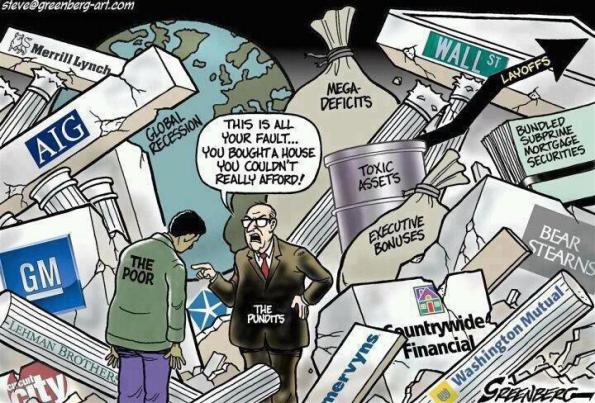
.
This blogpost was first published on The Daily Blog on 10 November 2016.
.
.
= fs =
-
25 November 2016 at 8:01 amThe Rise of Great Leader Trump | Frankly Speaking...
-
23 December 2016 at 8:00 amThe Sweet’n’Sour Deliciousness of Irony: Russia accused of meddling in US Election | Frankly Speaking...
-
31 January 2017 at 8:02 amCutting taxes toward more user-pays – the Great Kiwi Con | Frankly Speaking...
-
2 February 2017 at 8:03 amTrumpwatch: Voter fraud, Presidential delusions, and Fox News | Frankly Speaking...
-
6 February 2017 at 8:01 amTrumpwatch: Muslims, mandates, and moral courage | Frankly Speaking...
-
18 February 2017 at 8:02 amTrumpwatch: The Drum(pf)s of War | Frankly Speaking...
-
25 February 2017 at 9:37 amTrumpwatch: “… then they came for the LGBT” « The Daily Blog
-
2 March 2017 at 8:04 amTrumpwatch: “… then they came for the LGBT” | Frankly Speaking...
-
14 September 2019 at 8:01 amThe Abigail Article; Martyn Bradbury’s Article, and My Response | Frankly Speaking...
-
8 January 2021 at 9:02 am2020: The History That Was – Part 1 | Frankly Speaking...

